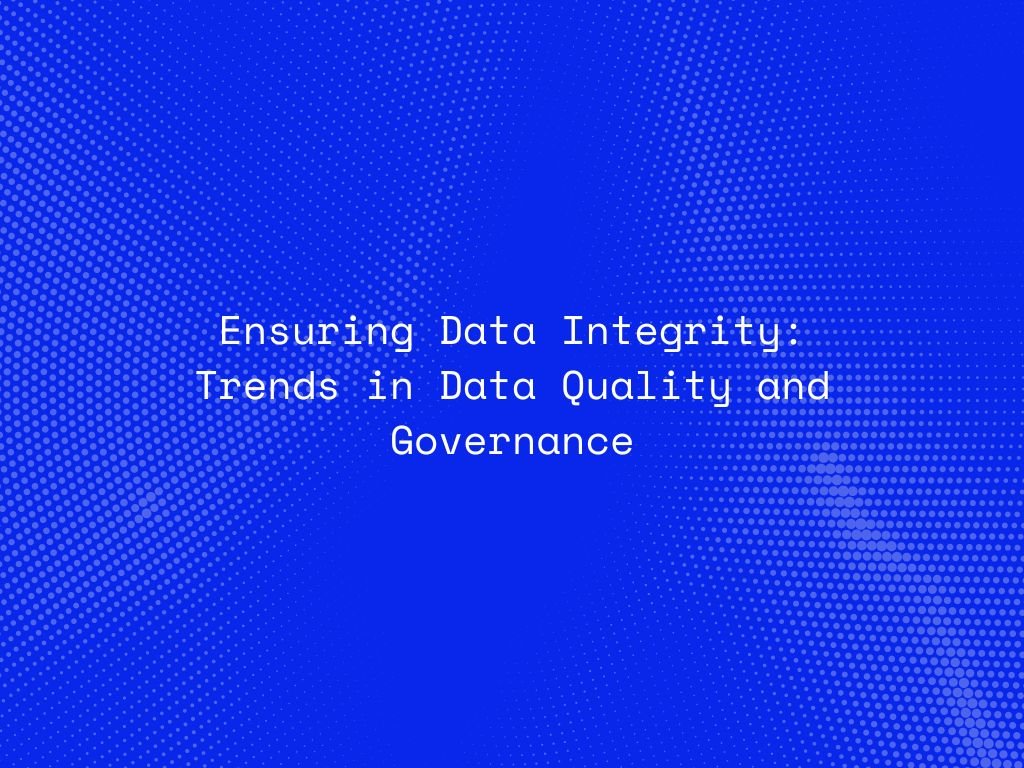In today’s data-driven world, the integrity of data is paramount. High-quality, well-governed data is essential for making informed business decisions, maintaining regulatory compliance, and ensuring operational efficiency. In this blog, we will explore the growing importance of data quality and governance, discuss current trends, and highlight automated tools and best practices for maintaining data integrity.
Understanding Data Integrity
Data integrity refers to the accuracy, consistency, and reliability of data throughout its lifecycle. Ensuring data integrity involves maintaining high standards of data quality and implementing robust governance practices. Poor data quality can lead to erroneous business decisions, increased operational costs, and regulatory penalties. Therefore, maintaining data integrity is crucial for any organization that relies on data for its operations.
Trends in Data Quality
Maintaining data quality involves ensuring that data is accurate, complete, consistent, and timely. Several trends are shaping the way organizations manage data quality:
AI and Machine Learning: AI and machine learning are increasingly being used to enhance data quality. These technologies can identify patterns and anomalies in data, enabling real-time validation and correction.
Real-Time Data Validation: The rise of real-time data validation tools allows organizations to identify and correct data quality issues as they occur, rather than after the fact.
Integration with Business Intelligence: Integrating data quality metrics into business intelligence and analytics platforms ensures that decision-makers have access to high-quality data, leading to more accurate insights and better decisions.
Trends in Data Governance
Data governance involves the overall management of the availability, usability, integrity, and security of data used in an organization. Key trends in data governance include:
Regulatory Compliance: With regulations like GDPR and CCPA becoming more stringent, organizations are increasingly focusing on compliance to avoid hefty fines and reputational damage.
Data Governance Frameworks: Adopting standardized data governance frameworks helps organizations establish clear policies and procedures for managing data. Frameworks like DAMA-DMBOK provide guidelines for effective data governance.
Role of Chief Data Officers: The role of Chief Data Officers (CDOs) is becoming more prevalent as organizations recognize the need for dedicated leadership in managing data governance and quality.
Metadata Management: Using metadata management tools allows organizations to track data lineage and ensure better oversight of data throughout its lifecycle.
Connect With Us
Automated Tools for Data Quality and Governance
Several automated tools and platforms are available to help organizations manage data quality and governance effectively:
Data Quality Tools:
- Talend: Offers data integration and data quality solutions that include data profiling, cleansing, and monitoring.
- Informatica Data Quality: Provides comprehensive data quality management capabilities, including data profiling, cleansing, and validation.
- Trifacta: Focuses on data preparation and quality improvement through user-friendly interfaces and machine learning.
Data Governance Tools:
- Collibra: A leading data governance platform that helps organizations manage data policies, stewardship, and compliance.
- Alation: Offers a data cataloging and governance solution that facilitates data discovery, collaboration, and stewardship.
- IBM Data Governance: Provides tools for managing data governance policies, compliance, and quality across the enterprise.
These tools offer features such as data profiling, cleansing, monitoring, and enforcement of governance policies, making it easier for organizations to maintain high-quality data and regulatory compliance.
Best Practices for Maintaining High-Quality Data
To ensure data integrity, organizations should adopt the following best practices:
Establish Clear Policies: Develop and implement clear data governance policies and procedures to guide data management activities.
Regular Audits: Conduct regular data audits and quality assessments to identify and address issues proactively.
Empower Data Stewards: Train and empower data stewards and stakeholders to take ownership of data quality and governance within their domains.
Leverage Technology: Utilize automated tools for data quality checks and governance to streamline processes and reduce manual effort.
Cultivate a Data-Driven Culture: Foster a culture of data quality and accountability by emphasizing the importance of data integrity across the organization.
Conclusion
Ensuring data integrity is critical for any organization that relies on data for decision-making and operations. By understanding the importance of data quality and governance, staying abreast of current trends, and leveraging automated tools, organizations can maintain high standards of data integrity. Adopting best practices and fostering a culture of data quality will further enhance an organization’s ability to manage data effectively.




